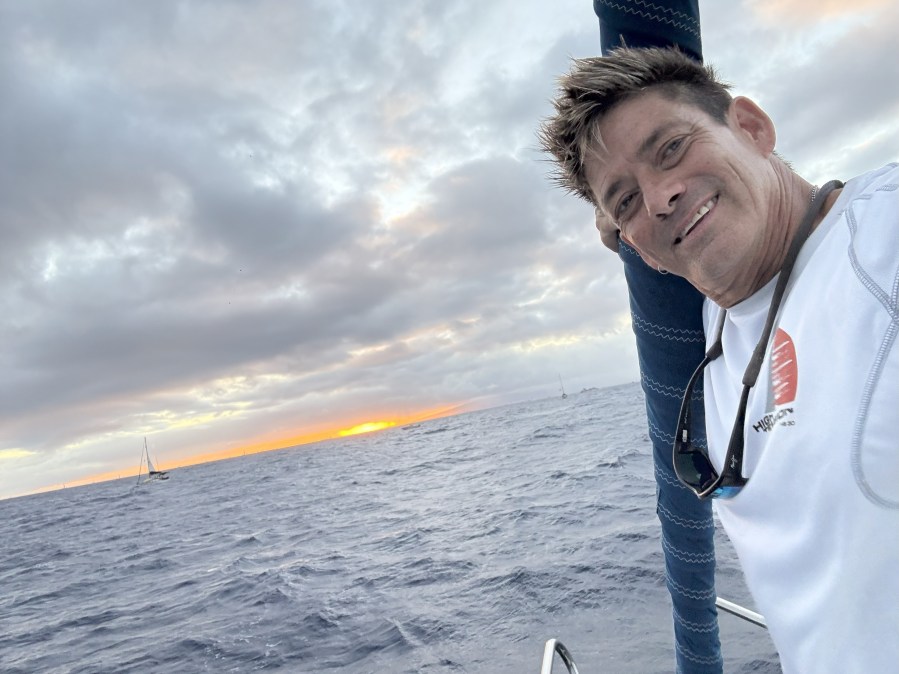HONOLULU (KHON2) — On Tuesday, July 29, the tsunami sirens sounded across Hawaiʻi. While most people moved inland or uphill, Chris Frendreis, local resident and champion mariner, went the other way, downhill, toward the harbor.
This was Frendreis’s fourth tsunami to take out his boats into open ocean for safety.
“I basically locked up the house here, called an Uber to take me to the yacht club,” Frendreis said. “Everyone else is coming up the hill, and I’m running down the hill to get my boat off the dock.”
Frendreis had to act fast. The warning came during rush hour, and the roads were jammed.
“The Uber kept getting closer, but the time estimate for its arrival kept getting longer,” he said. “So, I decided to bail on the Uber, put my shoes on, walk down to the marina.”
He already knew there was a problem with his boat, but he also knew he had to get out of the harbor.
“The engine alarm had started sounding on my previous outing, and I hadn’t had time to service it yet,” he said. “So, I was, like, I need to figure out what’s going on with my engine and see if it’s even worth trying to take it off the dock.”
But staying wasn’t an option since his boat neighbor was so close to his boat.
“[Our boats were] actually touching, except where fenders are keeping us separated,” Frendreis said of his slip neighbor. “If there’s a big wave coming, the two of us are just going to knock each other around and bang each other up.”
To prepare for the voyage and to give his engine an inspection, Frendreis ran the engine for an hour. It didn’t sound good; but it worked, at first.
“I finally went out, and everything was fine,” he said. “I motored out, I was cruising around out there for a couple hours… The engine seemed to be working fine.”
Then it all went dark.
“My navigation lights went out, my running lights,” he said. “Then the engine stalls; and I was, like, all right, this is not entirely surprising.”
Alone, in the dark, in 30-knot winds, Frendreis unfurled part of his jib and prepared to sail through the night.
“I was, like, I’m not going to have… if I don’t have my engine, I can’t charge my batteries,” he said. “So, no auto helm, no power winches… I’m going to basically manually sail this boat as long as I can.”
He texted his husband and a few close friends: “I’ve lost my engine. I don’t have nav lights… I’m going to go dark and save power… If you don’t hear anything, everything’s fine.”
He explained that conditions offshore were tough. “It was about five- to seven-foot seas and 25 to 30 knot winds,” he said. “It was a very exciting night.”
He explained that confused boats, crowded channels and Coast Guard warnings summed up the experience.
Out in the water, the harbor had emptied. But many boaters weren’t prepared.
“Some of them ran out of fuel; there were other boats that lost their engines,” Frendreis recalled. “There were all kinds of chatter on the radio all night long.”
Frendreis listened to radio chatter throughout the night and came to a clear conclusion: the Coast Guard was overwhelmed.
“They’re demanding everyone leave channel 16 and go to the non-official channel inter-boat chatter,” he said. “They seemed pretty frustrated… half the boaters out here don’t seem to know what they were doing.”
After the Coast Guard told the boaters to get their navigation lights on so the USCG could keep track of everyone, he tried to explain his own situation to them: “My running lights are out, my navigation lights are out… I’m falling back to the rear of the fleet.”
Sailing through the night, limping into harbor, Frendreis stayed offshore until morning.
“I did that till 8 a.m. the next morning,” he said. “I worked my way all the way back up towards Pearl City… and then came all the way up the bay to Diamond Head.”
At one point, the engine gave a flicker of life. Frendreis turned the ignition and saw the lights blink on.
“I thought, maybe it was finally cool enough,” he said. “Maybe it might actually run.”











Near the channel, he tried again. The engine chugged, sputtered, then slowly came to life. He eased it into dead slow forward and crept into the harbor at barely two and a half knots.
Relieved and aching, he was met at the dock by Will and the rest of his waiting friends. The return had taken 12 hours.
He tied up, climbed off the boat, and stood for a moment as he realized just how beat up, sore and exhausted he was.
“I just wanted to lie down,” Frendreis remembered.
He wasn’t the only sailor who’d struggled that night. A couple of other boats had lost power, too.
“There was a couple other boats that lost power,” he said. “I think one of them might have had to be towed in.”
Still, Frendreis kept it all in perspective. The storm had passed. The warning was just that, a warning. And another tsunami experience was behind him.
